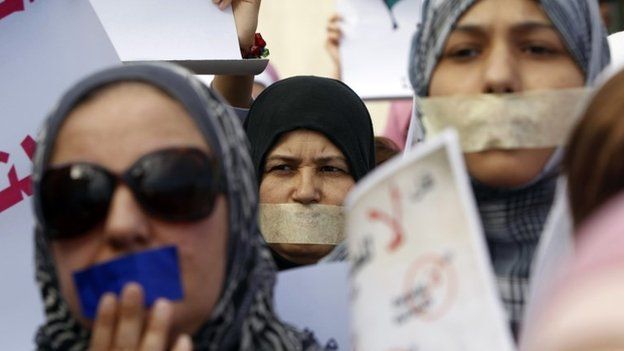Libya Gaddafi rape victims to be compensated
- Published

Women raped during Libya's 2011 uprising that toppled long-time ruler Muammar Gaddafi should be recognised as war victims, the cabinet has said.
Its decree, which needs congressional approval, would put the women on the same level as wounded ex-fighters and entitle them to compensation.
Pro-Gaddafi forces are alleged to have used rape as a weapon.
As Libya marks three years since the uprising began, voters are electing a body to write a new constitution.
It will be made up of 60 people - 20 from each of Libya's three regions.
'No burden'
During the revolution, the International Criminal Court said it had collected evidence that Col Gaddafi had ordered the rape of women as a weapon against rebel forces.
The BBC's Rana Jawad in the capital, Tripoli, says recognising rape victims is an unprecedented move in the conservative North African state, where it is a taboo subject.
Our reporter says it is not clear how many will come forward, but it is believed hundreds of women were raped.
Libyan Justice Minister Salah al-Marghani told the BBC that the decree offers 12 measures, including financial assistance and physical and psychological health care.
Money would also be available for things "like sending the parents of victims to Hajj - this is to elevate the status of victims, so they are not looked at as a burden", he said.
The justice ministry says it will not wait for the national congress to pass the decree in order to avoid further delays.
Voters spoke to the BBC's Rana Jawad at a polling station in Tripoli
Officials hope it will allow the country's national reconciliation efforts to move forward as it is seen as a significant step towards transitional justice, our correspondent says.
"Some victims can't go to school… they are suffering in silence and reconciliation efforts are suffering from all these outstanding issues," Mr Marghani told the BBC.
Libya has been facing increasing challenges across the country, with worsening security conditions and political divisions that have stalled progress since the conflict ended, our reporter says.
According to the AFP news agency, only 1.1 million of 3.4 million eligible voters have registered for Thursday's vote, compared to 2.7 million for the election of the interim parliament 19 months ago.
- Published14 June 2011